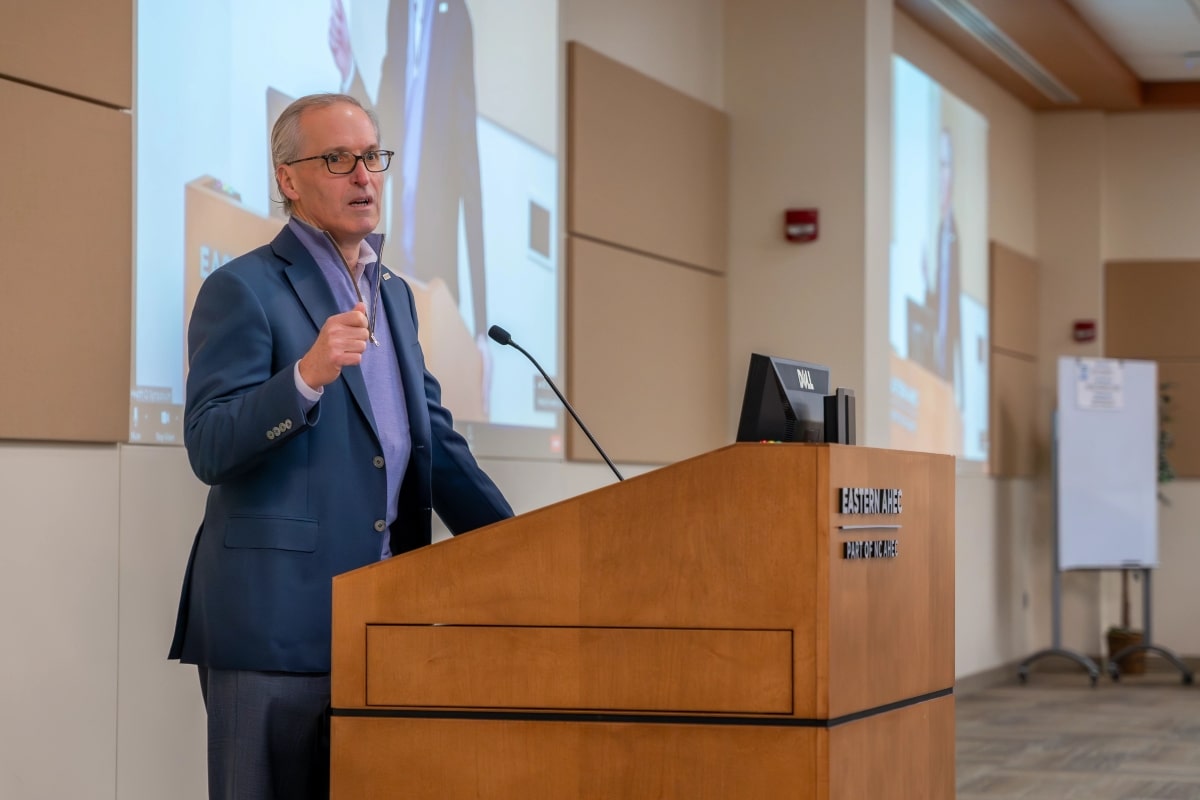Greenville, N.C. – ECU Health Medical Center Electrophysiology Lab is the first hospital lab in North Carolina to earn accreditation by the Intersocietal Accreditation Commission (IAC) in Cardiac Electrophysiology in the areas of Testing and Ablation, Device Implantation and Left Atrial Appendage Occlusion. IAC accreditation is a “seal of approval” that patients can rely on as an indicator of consistent quality care and a commitment to continuous improvement.
Accreditation by the IAC means that ECU Health Medical Center Electrophysiology Lab has undergone an intensive application and review process and is found to be in compliance with published standards, thus demonstrating a commitment to quality patient care. Comprised of a detailed self-evaluation followed by a thorough review by a panel of medical experts, the IAC accreditation process enables both the operational and technical components of the facility to be assessed, including representative case studies and their corresponding final reports.
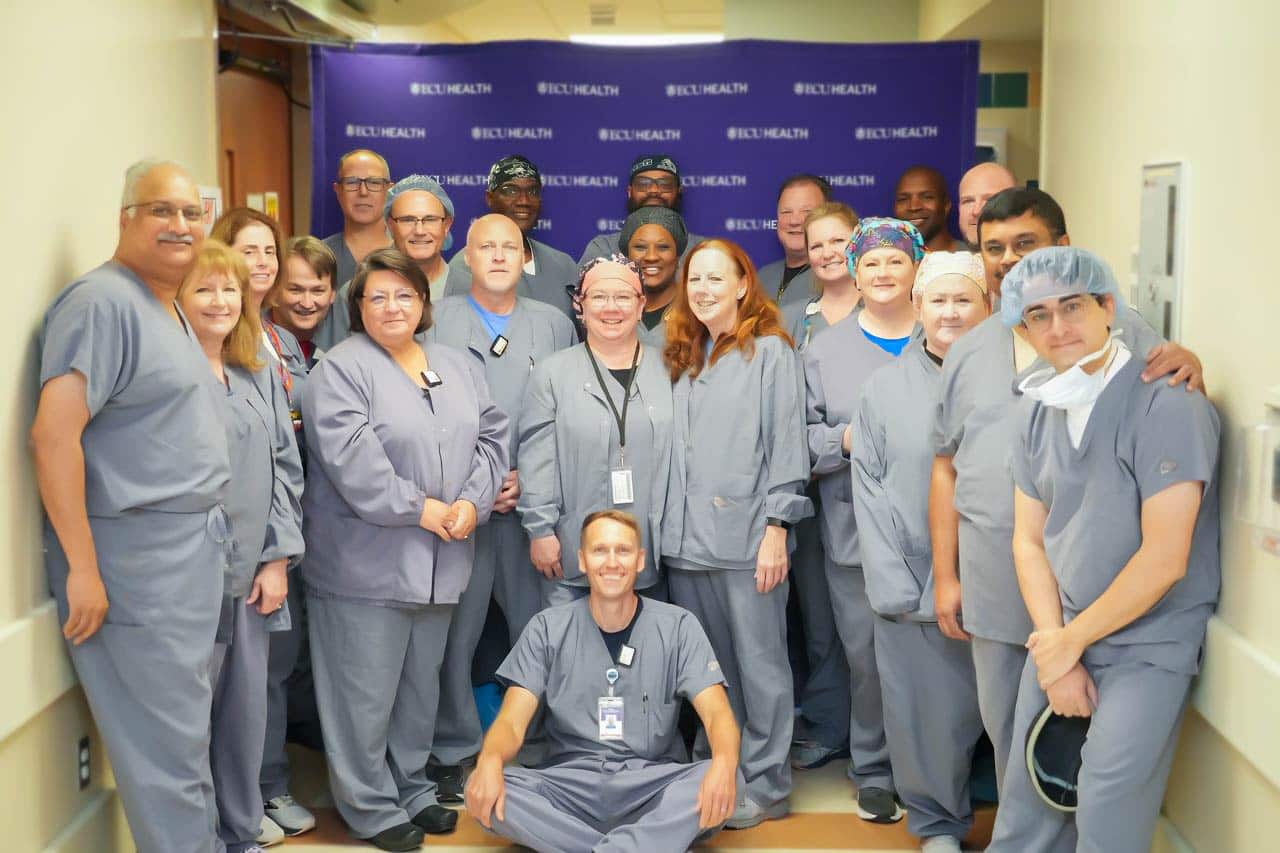
“ECU Health is dedicated to setting a national standard for rural health care and high-quality cardiovascular care,” said Jay Briley, president, ECU Health Medical Center. “Achieving IAC accreditation for the ECU Health Medical Center Electrophysiology Lab not only underscores our commitment to excellence but also highlights the unique advantage of offering advanced care in a rural setting. This milestone reaffirms our mission to enhance the health and well-being of eastern North Carolina by providing the latest technology and medical services close to home.”
Each year, more than one million cardiac device and ablation procedures are performed for the treatment of heart rhythm disorders worldwide. Cardiac electrophysiology procedures are performed by facilities that specialize in the diagnosis and treatment of heart rhythm disorders to relieve symptoms or regulate heart rate and rhythm. Cardiac electrophysiology is comprised of specialized diagnostic testing and therapeutic procedures performed by highly skilled health care professionals. The training and experience of the cardiac electrophysiology specialist performing the procedure, the type of equipment used and the quality assessment metrics each facility is required to measure, all contribute to a positive patient outcome.
“As a cardiologist and electrophysiologist, I know first-hand the importance of having high-quality cardiovascular services close to home for those who live in eastern North Carolina,” said Dr. John Catanzaro, professor and chief, Division of Cardiology, the Brody School of Medicine at East Carolina University, director of East Carolina Heart Institute, ECU Health Medical Center. “This new accreditation underscores our dedication to delivering exceptional patient care through adherence to the highest standards of quality and safety. Patients across eastern North Carolina can take heart knowing the ECU Health Medical Center Electrophysiology Lab has the highest-quality expertise and personnel available to care for them.”
ECU Health recently joined Pitt Community College and NC East Alliance to host teachers from across eastern North Carolina as part of the NC East Alliance STEM East Summer Teacher Leadership Institute series. The initiative, designed to deepen teachers’ understanding of the health science industry, featured interactive sessions and site visits aimed at showcasing diverse career opportunities and educational pathways within health care.
Teachers started the day by attending learning sessions at Pitt Community College, where they heard from ECU Health experts about a variety of health care and health sciences topics. Following the sessions, the teachers took a tour of ECU Health Medical Center where they learned about the region’s only Level I academic medical center.
Jacqueline Thompson, a CTE teacher at Bertie Middle School, wanted to find interactive educational opportunities so her students have the chance to learn about different health care careers.

“During our information sessions, they not only talked about health care careers for people like me who teach health sciences and career exploratory, but also for math teachers and science teachers or English teachers,” said Thompson. “It helps teach us, ‘How can I collaborate with other teachers and work with them on reinforcing what we’re teaching to students?’”
As the largest employer in eastern North Carolina’s 29-county region, ECU Health has an interest in inspiring the next generation of health care workers and these partnerships help drive the health system’s ability to ensure future generations have access to high-quality care.
“ECU Health was eager to participate in this event because teachers play a crucial role in shaping a student’s understanding of career opportunities in health care,” said Lisa Lassiter, director of Workforce Development, ECU Health. “The more the teachers know and understand about health care themselves, the more they can inspire and educate the students. In addition to exposing the teachers to careers in health care, we had the opportunity to ensure teachers have an awareness of the values and professional skills needed so they can also incorporate the learning of those skills in the classroom.”
Another benefit of the collaboration is the opportunity to expand students’ knowledge on different health care careers, both in and outside of their community
“From a rural perspective, our students often only think of jobs of what they see in the community,” said Thompson. “There are more careers outside the community and we can give them exposure to different careers they’ve never dreamt of doing because they didn’t know it exists. We are seeing these careers and learning about their educational paths so we can teach our kids that they don’t have to go to a four-year college. You could get a two-year degree or a certification and stay in eastern North Carolina.”
Melissa Decarlo, physical therapist IV, Rehab Neurosciences Program, ECU Health Medical Center, regularly gives tours to students, and she was excited to be able to provide education to teachers in the community on this tour.
“For me, I enjoy what I do as a physical therapist here, touching the patients’ lives and their families’ lives,” said Decarlo. “I also think it’s our responsibility to spread the knowledge about what we do into the community. I think by doing the tours I am lighting a spark of interest and excitement within the students and showing the teachers what we do so they are better equipped to teach their students about our careers.
The collaboration between ECU Health, Pitt Community College and NC East Alliance not only supports professional development for educators but also aims to foster a new generation of healthcare professionals in eastern North Carolina.
ECU Health offers many opportunities for team members to further their education and pursue their dreams, including the HomeGrown Program and tuition reimbursement. After years of deferring her dream to become a nurse, Michelle Dixon, now a staff nurse IV working in the ECU Health Patient Testing Center, used the HomeGrown Program and tuition reimbursement to receive her associate’s degree in nursing.

Michelle Dixon
When she was in high school, Michelle said she didn’t have many people encouraging her in her education.
“My plan was to be a childcare teacher because I love kids,” she said. But her brother’s mentor, George Lauteres, encouraged her to think about nursing as a career. “He always wanted to see my reports cards and said, ‘Michelle you are smart; you should be a nurse.’ And then he’d bring the newspaper to show me how many nursing jobs there were. He said, ‘You’ll always have a job.’”
After high school, Michelle attended Pitt Community College to complete her prerequisites for the nursing program, but she ended up having to drop out due to changes in her circumstances. She worked in various jobs until a connection through a temp agency in 1998 landed her a position at what was then know as Pitt County Memorial Hospital, now ECU Health, in the Central Services Department, where she worked for eight years.
“But there was a point when I wanted to do more,” Michelle said; and that’s when she thought about her original plan to become a nurse.
She heard about the HomeGrown program through co-workers who were going through the program to become surgical technicians. When her manager in Central Services, Audrey Williams, learned Michelle was interested in a career change, she supported her fully.
“She made it possible for me to work the hours I needed so I could take classes and participate in clinicals,” Michelle said. “She did everything she could to help me, and every time I completed a class, I couldn’t wait to show her my grades. She made me want to be better.”
The HomeGrown Program allows ECU Health team members to go back to school for specific degree programs, including RN, surgical technology or respiratory therapy, while working 20 hours a week and keeping their full salary and benefits. This was enormously helpful to Michelle, who said that without the program, she would not have been able to continue to work while also working toward her degree: “I was able to work 10 hours on Saturdays and 10 on Sundays, which let me take my classes and study and attend clinicals during the week.”
Applying for the program was easy; “it was getting into the program that was the hard part,” she laughed. Through the HomeGrown Program and with her manager’s support, Michelle completed her degree in 2008. After graduation, she joined the 2 South team in Internal Medicine, and she trained as a charge nurse and clinical coach.
In 2020, Michelle again felt there was more she wanted to do, so she returned to school to get her Bachelor of Science in Nursing (BSN) from the University of North Carolina in Wilmington (UNCW). It was at this point she joined the team in Patient Testing Services. Again, she found herself surrounded by supportive and encouraging mentors. Heather Smith and Glenda Flemmings, both RNs in the Patient Testing Center, encouraged Dixon to complete the Aspiring Nurse Leader Program and pursue certification in Ambulatory Care Nursing.
“They allowed me to take the time I needed, and they encouraged me to get my master’s, which is what I decided to do,” she said. Using ECU Health’s tuition reimbursement, Dixon recently returned to UNCW to get her master’s in Healthcare Administration.
Michelle said without the HomeGrown Program and tuition reimbursement, as well as the support she received from her mentors along the way, she wouldn’t have been able to pursue her dream of becoming a nurse.
“For that initial nursing degree, I had to go to clinicals, and I just couldn’t do that and work 40 hours a week. I would not otherwise have had the opportunity to go back to school and be a nurse.” And she loves being nurse, mostly because of the time she gets to spend with patients. “I feel like I’ve learned as much from them as I have from my education,” she said. “They help me appreciate life and give me a whole new perspective.”
The HomeGrown Program, Michelle said, is important because it helps entry-level team members like her to grow the organization from within.
“This is a way we can grow our own team members and keep them within the organization,” she said. “With the nursing shortage, these types of positions are crucial.” That’s why Michelle wants everyone to know about the HomeGrown Program and tuition reimbursement. “Because of ECU Health, I am the first person in my family of 13 children to graduate from college,” she said. “A lot of people have aspirations like me, but they don’t know the route to get there.”
The HomeGrown Program has been offered at ECU Health for more than 30 years, and candidates are selected through a highly competitive application process. Team members must meet eligibility requirements and go through interviews before being admitted to their program. After successfully graduating, team members have a two-year commitment to work full-time for ECU Health.
Greenville, N.C. – Michael Waldrum, MD, MSc, MBA, ECU Health chief executive officer and dean of the Brody School of Medicine at East Carolina University, has been named chair-elect of the AAMC (Association of American Medical Colleges) 2024-25 Board of Directors. The incoming board’s term begins Nov. 12, 2024, and will end November 2025, after which Dr. Waldrum will assume the role of board chair.
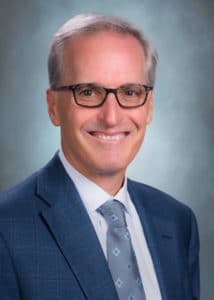
Dr. Michael Waldrum
Dr. Waldrum was named chief executive officer of ECU Health in 2015 and named dean of Brody in 2021. He previously served as president and CEO of The University of Arizona Health Network and as CEO of the University of Alabama Hospital at Birmingham. Dr. Waldrum is a specialist in critical care medicine and pulmonology and is trained in internal medicine. He received his medical degree from the University of Alabama at Birmingham School of Medicine and completed his residency at the Mayo Clinic in Minnesota.
Dr. Waldrum has served as chair of the AAMC’s Council of Teaching Hospitals and Health Systems (now called the Council of Academic Health System Executives) since 2022, where his unique rural health care perspective helped shape discussions around the complex issues facing rural communities across the nation and how academic medicine can help solve those challenges.
“I am extremely honored to serve as chair-elect of the prestigious AAMC Board of Directors, which has long been a powerful voice in academic medicine,” said Dr. Waldrum. “I look forward to continuing to work closely with highly respected academic health leaders from across the nation who are passionate about ensuring quality health care is available to all, including those living in rural communities. While there are certainly complex challenges facing health care nationally, the AAMC’s collective expertise helps chart new paths forward that improve the lives of many. It is humbling to be a part of this important work.”
The AAMC is a nonprofit association dedicated to improving the health of people everywhere through medical education, health care, medical research, and community collaborations. Its members are all 158 U.S. medical schools accredited by the Liaison Committee on Medical Education; 13 accredited Canadian medical schools; approximately 400 teaching hospitals and health systems, including Department of Veterans Affairs medical centers; and more than 70 academic societies. Through these institutions and organizations, the AAMC leads and serves America’s medical schools and teaching hospitals and the millions of individuals across academic medicine, including more than 193,000 full-time faculty members, 96,000 medical students, 153,000 resident physicians, and 60,000 graduate students and postdoctoral researchers in the biomedical sciences. Following a 2022 merger, the Alliance of Academic Health Centers and the Alliance of Academic Health Centers International broadened the AAMC’s U.S. membership and expanded its reach to international academic health centers.
Greenville, N.C. – ECU Health and the Brody School of Medicine at East Carolina University celebrated the graduation of the first ever cohort of resident physicians in the Rural Family Medicine Residency Program on June 30, before officially welcoming the latest class of resident physicians into the newly expanded program July 1, marking two important milestones in a program uniquely designed to help meet the academic rural health mission.
Launched in 2021, the Rural Family Medicine Residency Program provides recent medical school graduates interested in serving as family medicine physicians in rural communities first-hand experience in caring for patients in the kind of under-served settings they plan to practice in upon completion of their residency training.
The inaugural class of Rural Family Medicine Residency Program graduates and their plans for practicing are as follows:

- Dr. Jim Jaralene Porquez will start a new family medicine outpatient practice located in the ECU Health Multispecialty Clinic – Kenansville and provide hospitalist coverage at ECU Health Duplin Hospital.
- Dr. Zeel Shah will serve as a hospitalist at ECU Health Beaufort Hospital and will also provide precepting to resident physicians at Roanoke Chowan Community Health Center.
- Dr. Raza Syed will join a sports medicine fellowship program in Spokane, Washington, with plans to return to North Carolina after his one-year fellowship commitment to start practice.
- Dr. Amy White Jones will move to rural western Minnesota to practice outpatient medicine at Sanford Health System.
“I could not be more proud of the four inaugural graduates from the ECU Health Rural Family Medicine Residency Program, who have all embraced the rural mission and helped pioneer this important program,” said Dr. Audy Whitman, program director of the Rural Family Medicine Residency Program. “Each of these physicians have a passion for serving rural communities and have embraced the challenge of providing care in areas where their services are critically needed. Their unique training has given them a unique understanding of how to deliver high-quality primary care in rural environments and I take immense pride in knowing they will have an incredible impact in the communities in which they will soon practice.”
Despite rural communities representing nearly 20% of the U.S. population, only 10% of U.S. physicians practice in rural areas. The ECU Health Rural Family Medicine Residency Program aims to increase the number of physicians practicing in rural America, especially eastern North Carolina. Studies show that family medicine resident physicians who spent 50% or more of their training time in rural settings were at least five times more likely than resident physicians with no rural training to practice in a rural setting.
The program exposes resident physicians to the breadth of family medicine — in both an academic medical center environment and in rural environments — so they are well-prepared to provide comprehensive care in a variety of practice settings. The resident physicians spend a majority of their first year of training at ECU Health Medical Center in Greenville before spending the next two years training at a regional location where they build connections with their patients and become integrated into the communities they serve.
The Rural Family Medicine Residency Program also received recent approval from the Accreditation Council for Graduate Medical Education to expand its class size and add an additional training site location, bringing the program to nine residents per class across three sites: in Ahoskie at the Roanoke Chowan Community Health Center and ECU Health Roanoke-Chowan Hospital; in Duplin County at Goshen Medical Center in Beulaville and ECU Health Duplin Hospital in Kenansville; and in Roanoke Rapids at Rural Health Group Halifax Medical Specialists and ECU Health North Hospital, which is the newest training site in the program.
The newest Rural Family Medicine Residency Program class includes:
- Dr. Flora Danquah, Ahoskie Site
- Dr. Danh Pham, Ahoskie Site
- Dr. Saima Shawl, Ahoskie Site
- Dr. Andre Mancheno-Rubio, Duplin Site
- Dr. Shelley Matthews, Duplin Site
- Dr. Jaya Purathur, Duplin site
- Dr. Tanweer Hoosen, Roanoke Rapids Site
- Dr. Tobi Okafor, Roanoke Rapids Site
- Dr. Joy Onyeanuna, Roanoke Rapids Site
“This is an exciting time at ECU Health and the Brody School of Medicine as we are truly charting the future of rural academic health care in the spirit of the shared mission to improve the health and well-being of eastern North Carolina,” said Dr. Michael Waldrum, CEO of ECU Health and dean of Brody. “When resident physicians practice and train in rural communities, they develop an intimate appreciation for the importance of rural health care. The program’s continued growth is a testament to all who have worked hard to make the Rural Family Medicine Residency Program a reality and it is humbling to know our organization is making a profound impact on rural communities through these innovative efforts.”
Greenville, N.C. – The 2024 ECU Health Board Quality Leadership Award winners were recognized by the ECU Health Board of Directors June 25, 2024. These winning teams are a representation of excellent work across the system that drives the quality goal of zero harm, creates exceptional experiences and improves patient outcomes. Numerous nominations were reviewed by the committee, and the winning team are as follows:
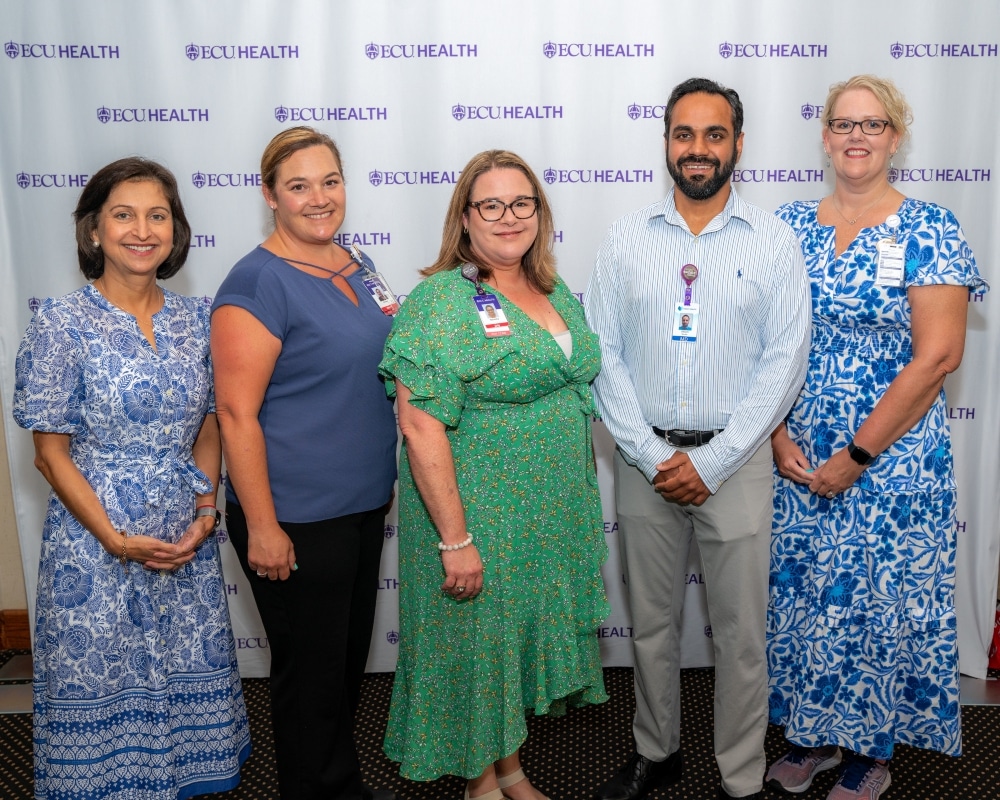
ECU Health Medical Center – Cutting CAUTIs in the Neurosciences ICU: A Collaborative Approach. The project leaders were: Natasha Drake, BSN, RN, CCRN – NSICU Nurse Manager, Vikram Bhinder, MD – NSICU Medical Director and Aimee Dunn, BSN, RN, CCRN, SCRN – NSICU Staff Nurse IV. The team members were: Sarah James, BSN, RN, CCRN – NSICU Assistant Nurse Manager, Morgan McGraw, BSN, RN – NSICU CAUTI Representative and Erin Pearson, BSN, RN – ECU Health Medical Center Office of Quality.
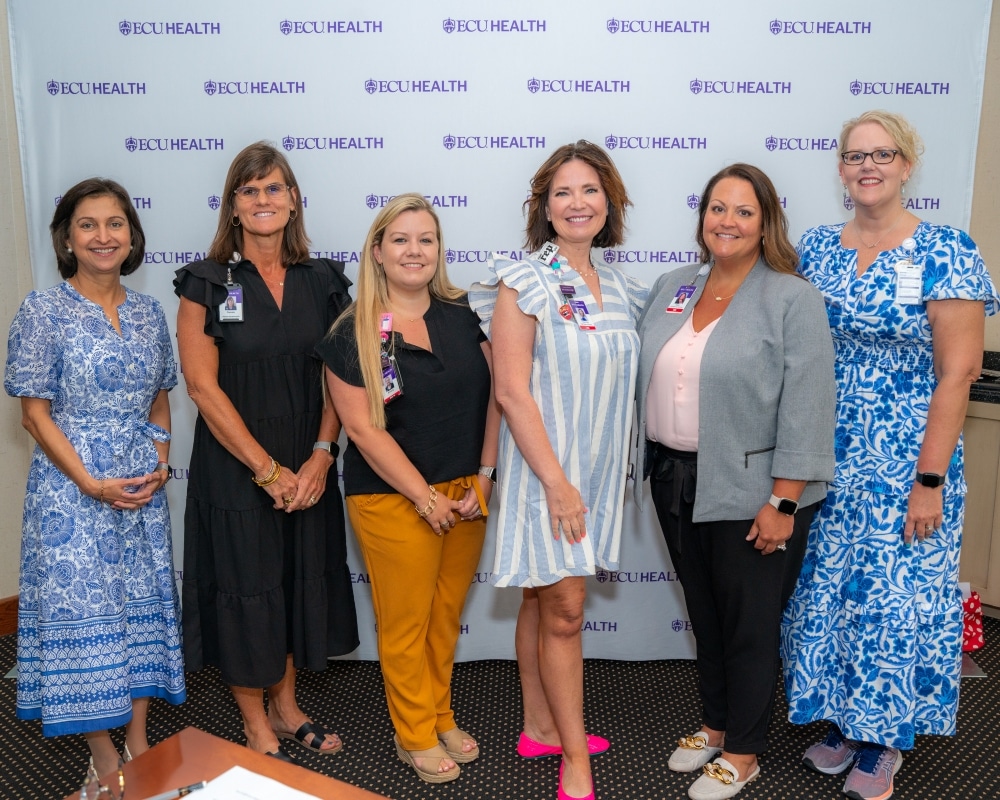
ECU Health Chowan Hospital – Catheter Associated Urinary Tract Infection (CAUTI) Prevention in the Inpatient Setting. The project leaders were: Courtnay Hale, BSN, RN – Manager of ICU/MedSurge, Dana Byrum, DNP – Vice President, Patient Care Services and Matthew Rapp, MD – Hospitalist Director and Beverly Venters, MSN – Quality Director. The team members were: Brittany Proctor, BSN, RN, Pam Ward, ICP, Katie Hall, QNSIII.

ECU Health Ambulatory – ECU Health Bertie – Family Medicine, Windsor – Improving Diabetes Management in the Ambulatory Setting. The project leaders were: Kristin Woodard, MSN, RN – Education Nurse Specialist, Phillip Harris, MD and Kelsey Gurganus, MSN, RN – Manager of Family Medicine, Windsor. The team members were: Erica Ford, PA, Teddie Gore, NP, Jesse Ann Hamilton, NP and all staff of Family Medicine, Windsor.
To receive this honor, team members submitted projects that demonstrated at least two of the following requirements:
- Quantifiable improvement in an organizational quality priority with sustained excellence over time
- Demonstration of empathy and compassion in patient care
- Implementation of innovative solutions to patient care problems
- Community outreach that addresses the social determinants of health in a meaningful way
“We are proud of our teams who dedicate themselves to improving patient care in eastern North Carolina,” said Robert Greczyn, chair, ECU Health Board of Directors. “The Board Quality Leadership Awards symbolize the excellence and compassion our team members demonstrate every single day as they care for our patients across our region. On behalf of the Board, we are grateful to all ECU Health team members for their tireless efforts in delivering excellence in rural care and helping us meet our mission to improve the health and well-being of the region.”
Greenville, N.C. – ECU Health Medical Center has once again earned Magnet® recognition, which is awarded every four years and represents the highest national honor for professional nursing practice, marking its third consecutive successful accreditation for exemplary nursing practice. The American Nurses Credentialing Center’s Magnet Recognition Program® distinguishes health care organizations that meet rigorous standards for nursing excellence.
“Earning Magnet recognition is a tremendous honor and reflects our commitment to delivering the highest quality of care to eastern North Carolina,” said Trish Baise, chief nursing executive, ECU Health. “Our repeated achievement of Magnet recognition is an incredible source of pride for our nurses and drives our entire nursing program to strive harder each day to meet the health care needs of the people we serve This prestigious designation is a testament to the dedication, professionalism and compassion of our outstanding nursing team in collaboration with our interprofessional partners across the health system.”

Research demonstrates that Magnet recognition provides specific benefits to health care organizations and their communities, such as:
- Higher patient satisfaction with nurse communication, availability of help and receipt of discharge information.
- Lower risk of 30-day mortality and lower failure to rescue rates.
- Higher job satisfaction among nurses.
- Lower nurse reports of intentions to leave their positions.
Magnet recognition is the gold standard for nursing excellence. To achieve initial Magnet recognition, organizations must pass a rigorous and lengthy process that demands widespread participation from leadership and staff. This process includes an electronic application, written patient care documentation, an on-site visit and a review by the Commission on Magnet Recognition.
Health care organizations must reapply for Magnet recognition every four years based on adherence to Magnet concepts and demonstrated improvements in patient care and quality. An organization reapplying for Magnet recognition must provide documented evidence to demonstrate how staff members sustained and improved Magnet concepts, performance and quality over the four-year period since the organization received its most recent recognition.
“ECU Health nurses carry forth a legacy of excellence, which was first recognized by the Magnet® Recognition Program in 2013,” said Brian Floyd, chief operating officer, ECU Health. “Since then, our nurses have continually raised the bar for patient care and inspire every member of our team to strive for excellence every day. This year’s Magnet recognition affirms our commitment to meeting our mission of improving the health and well-being of eastern North Carolina. We could not be more proud of the excellent nursing teams in collaboration with our interprofessional partners that made this recognition possible for the third time.”
ECU Health Maynard Children’s Hospital’s Neonatal Intensive Care Unit (NICU) offers the highest level of care for the most fragile of patients; it is staffed with a team of experts who care for critically ill or premature newborns. One of those specially trained nurses is Tara Stroud, who was named in February the vice president for Maynard Children’s Hospital, Women’s Service Lines and Community Health Programs. Recently, Tara received another well-earned recognition—this time as a recipient of the March of Dimes Excellence in NICU Leadership Award.
The national award honors NICU leaders who effectively support their team, advance the care of patients and the operation of their unit, have strategic vision and have excellent communication skills. Only one winner is recognized annually, and this year, Tara Stroud was honored with the award at the Synova 2024 NICU Leadership Forum.
Tara didn’t initially consider nursing as a career when she was younger. “I thought I would be a vet because I love animals,” she said. “But a love for nursing found me.”

After a clinical rotation in a NICU, Tara said she knew that was exactly where she wanted to be. “I wanted to do something that had meaning and value. The babies in the NICU are so critically ill and depend on you for everything, but they’re also so resilient. There’s something about the babies that gives you a different impression on life. That’s what captured and kept me.”
An eastern North Carolina native, Tara joined ECU Health in 2006 after receiving her BSN from East Carolina University. She’s since received an MSN as a neonatal nurse practitioner and her doctorate in nursing executive leadership, and she is excited about the road ahead for ECU Health.
“When you work for ECU Health, the possibilities are endless. When I started in the NICU, I didn’t know where my career would take me. Advancing my education and going into leadership roles was an opportunity ECU Health gave me.” She also loves that her work gives back to her community. “Eastern North Carolina is my home. I want to be where women and children receive exceptional care. If we weren’t here, some of our babies wouldn’t survive a trip. It’s critically important that we are here.”
Tara loves working with the NICU team, a group of leaders and team members who “lead with their hearts,” as she puts it, but she also sees many opportunities in her new role as vice president.
“It’s a chance to solidify the vision for ECU Health for the future of women’s and children’s care across the system,” she said. “We’re focusing on a more holistic view of health across the continuum of care, because both maternal and child health is important to our future. I’m excited to lead ECU Health to continue to impact that health continuum for both mother and child.”
This passion and dedication to her field is why she was recently recognized as the 2024 March of Dimes Excellence in NICU Leadership Award winner. Although “not a crier,” Tara admits she teared up when she learned she won the award. It was even more special that she was able to accept the award at the Synova 2024 NICU Leadership Forum with her husband and daughter in attendance.
“Winning the award surprised me,” she said. “I never thought I would win a national award, but when you’re focused on trying to provide exceptional care, sometimes you don’t realize the impact you’re having on others.”
That impact was clearly noted in Tara’s nomination form, which was submitted by her team and without her knowing. “Tara is an innovative leader who has a vision for the future unlike any I’ve worked with,” said one nominator. Another’s quote read: “She has left a forever impact on the leader I strive to be . . . thank you for leading us to excellence.”
Tara acknowledged that one of her greatest goals and achievements has been to guide her team members into leadership roles.
“My job is to grow the leaders of tomorrow. When my team said I have given each of them a chance to be leaders and make a difference in eastern North Carolina, that sticks with me more than anything,” she said. “To be recognized for this specific award for a population that is so important to me – and to know my team nominated me – it’s an award I cherish.”
The much-deserved award reiterates Tara’s focus on the future of ECU Health’s role in neonatal and maternal care.
“We are laser-focused on providing exceptional care for neonates and mothers in our region,” she said. “Babies in the NICU are getting smaller and surviving at younger ages year over year, and we are continuously adapting our care pathways to meet these needs. We’ve accomplished great work, but there’s more to be done.”
Resources
Greenville, N.C. – Tara Stroud, DNP, APRN, NNP-BC, NEA-BC, vice president of Women’s and Children’s Services, James and Connie Maynard Children’s Hospital at ECU Health Medical Center, was recently awarded the March of Dimes Excellence in Neonatal Intensive Care Unit (NICU) Leadership Award. Stroud accepted the national award at the Synova 2024 NICU Leadership Forum in Charlotte Harbor, Florida.
“I am deeply honored to receive the March of Dimes Excellence in NICU Leadership Award, especially knowing that my team nominated me for an award that recognizes excellence of care in a population that is so important to me,” said Stroud. “Our focus on improving the quality of care for neonates is unwavering, and this national award affirms that ECU Health is a model for exceptional care, particularly in rural communities. I am excited to help lead ECU Health in solidifying our vision for women’s and children’s care across eastern North Carolina.”
The March of Dimes Excellence in NICU Leadership Award honors NICU leaders who effectively support their team, advance the care of patients and the operation of their unit, have strategic vision and have excellent communication skills.

The NICU at Maynard Children’s Hospital offers the highest level of care for the most fragile of patients and is staffed with a team of experts who care for critically ill or premature newborns. Allyson Yelverton, director of Patient Care Services at the Level IV NICU, led the nomination initiative for Stroud’s team.
“Tara is an innovative leader who has a vision for the future, centered around the health and well-being of our patients,” said Kathryn Jarvis, senior director, Patient Care Services, Maynard Children’s Hospital. “She has helped grow high-performing leaders across the organization and serves with a passion for the patients and families we care for every single day. We were excited to nominate her and are so pleased that she was selected for this deserving recognition.”
An eastern North Carolina native, Stroud joined ECU Health in 2006 after receiving her Bachelor’s of Science in Nursing from East Carolina University. Stroud earned a Master of Science in Nursing as a neonatal nurse practitioner and a Doctor of Nursing Practice degree. Stroud worked in the NICU for many years and as senior administrator of Children’s Services at Maynard Children’s Hospital and was named the vice president of Women’s and Children’s Services in February. After becoming vice president, Maynard Children’s Hospital became the only Level I Pediatric Trauma Center serving eastern North Carolina.
“We at ECU Health are proud of Tara for being awarded the March of Dimes Excellence in NICU Leadership Award,” said Trish Baise, chief nursing executive at ECU Health. “Tara’s recognition at the national level is a testament to her unwavering commitment and the exceptional work her team does to advance the quality of care we provide. We are fortunate to have mission-driven individuals like Tara who help us lead the way in becoming the national model for academic rural health care.”
Youth across the state now have better access to mental health services as part of the expansion of the North Carolina Statewide Telepsychiatry Program (NC-STeP), an initiative of East Carolina University’s Center for Telepsychiatry.
Five pediatric primary care sites from the mountains to the coast are providing mental health care for children and adolescents through NC-STeP-Peds. Catawba Pediatric Associates, PA; Clinton Medical Clinic; ECU Pediatrics Clinic; Robeson Pediatrics; and Surf Pediatrics have joined the NC-STeP-Peds network. Once contracts are final, Peachtree Pediatrics in Cherokee will be established as the final of six sites.
NC-STeP-Peds is funded by a $3.2 million investment from the United Health Foundation (UHF). It continues the foundation’s commitment to work with ECU to address mental health challenges in North Carolina and provide mental health care services to children and adolescents in rural and underserved parts of the state.
Dr. Sy Saeed, director of the ECU Center for Telepsychiatry and founding executive director of NC-STeP, said the program offers an innovative approach to providing mental health services through expert consultation support for pediatricians and other clinicians through telemedicine. The model provides integrated care closer to home and deploys several technological innovations.
Each participating practice has a space within the clinic where patients meet virtually with a licensed clinical social worker (LCSW) for therapy sessions. Patients referred for psychiatric care will meet virtually with the psychiatrist in the same space.
“Telepsychiatry is a viable and reasonable option for providing psychiatric care to those who are currently underserved or who lack access to services,” Saeed said. “NC-STeP is also helping address a pressing and difficult challenge in the health care delivery system today with the integration of science-based treatment practices into routine clinical care. We are able to provide telehealth appointments for therapy with a licensed clinical social worker and psychiatric care at their pediatric clinic.”
The initiative’s virtual reality component, “NC Rural Kids Get Well,” has been created by Dr. Yajiong “Lucky” Xue, the Robert D. Teer Distinguished Professor in the Department of Management Information Systems, and students in the ECU College of Business. It provides a 3D community on the Roblox platform to serve three main purposes: education, peer support and surveillance.
Participating pediatricians are beginning to see results from the initiative in their practices.
Dr. Katie Lowry ’00, a pediatrician at Robeson Pediatrics, witnessed her hometown of Lumberton suffer two 100-year floods and the COVID-19 pandemic within a five-year span. She said the emotional impact resulted in increased anxiety and depression among her pediatric patients.
“We still have a long time to kind of get out of those difficulties that they were in,” she said. “Before we were able to get access to NC-STeP and provide that here in our office, we had maybe 150 on our waitlist for counseling.”
Lowry said being part of NC-STeP-Peds brings counseling and psychiatric care into her practice where children and their families are comfortable receiving health care.
“I think the biggest thing is [NC-STeP-Peds] has absolutely just crushed the stigma barrier,” Lowry said. “They’re receiving care in a place that they always receive their care. They don’t have to go to another facility. They don’t have to drive another hour. It’s right here for them, and that has been amazing for our patients.”
Overwhelming need
Dr. Christian Lige, a pediatrician at Surf Pediatrics in Dare County, said NC-STeP-Peds provides more timely care and is an avenue for providing more collaborative care for his patients. Prior to NC-STeP-Peds, the number of patients needing access to mental health services was overwhelming.
His practice sees patients from Dare and four surrounding counties. NC-STeP-Peds allows Lige to connect his patients to care more quickly. Lige said before NC-STeP-Peds, it could have taken nine months to a year to have an appointment with a psychiatrist.
“It’s really difficult to wait to see a psychiatrist for a year when a kid is struggling,” Lige said. “I’m hoping that with us talking with the psychiatrist, with our nursing staff and with the social worker, we’ll have a better picture of what’s going on with the patient.”
Through NC-STeP-Peds, Lige’s patients have their first virtual appointment with a behavioral health manager within weeks. The assessment determines if a psychiatric appointment is needed, and a virtual appointment with the NC-STeP-Peds psychiatrist follows in a few weeks.
“We see quite a few kids who go off and get admitted to a hospital because of an issue. They leave here and they’re on no medicines and they come back on four medicines. For a primary care doc to take care of four psychiatric medications is difficult,” Lige said. “So, we’ve had the ability now to speak to a psychiatrist so we can get input from them on the medicines and interactions, and that’s been very helpful.”
Assessing needs
In the 10 months since the sites launched more than 10,000 children and adolescents have been screened for mental health issues. Saeed said the screenings indicated more than 1,000 had demonstrated an increased likelihood of a behavioral health disorder and 1,800 had demonstrated at least a “mild to moderate” level of anxiety.
“Our ability to screen a large number of children since the program’s inception helps increase awareness of mental health issues in children and emphasizes the importance of addressing these concerns in these communities,” he said. “We currently have more than 200 children and adolescents receiving integrated behavioral and primary care services as part of the program.”
Paula Bowen is one of three LCSWs hired through the UHF grant for NC-STeP-Peds. As a behavioral health manager for the program, Bowen reviews referrals from the pediatric sites and holds virtual intake appointments with the patients and families.

“We’re available to diagnose, make referrals to the psychiatrist and [provide] therapy for the children,” Bowen said. “NC-STeP has increased availability to therapy for kids. We can provide a lot of education [for the families]. Even basic mental health education can go a long way to help parents and their children.”
Saeed said NC-STeP-Peds addresses mental health needs at a critical stage. A recent JAMA Pediatrics study of an estimated 46.6 million U.S. children showed that the national prevalence of children with a treatable mental health disorder who did not receive needed treatment or counseling from a mental health professional was 49.4%. In North Carolina, that number was 72.2%.
Much of that has to do with a shortage of mental health providers — 94 out of 100 counties in North Carolina are designated as mental health professional shortage areas, Saeed said.
“For a young person with symptoms of a mental disorder, early treatment can help prevent persistent and more severe problems later in life,” he said. “Thanks to UHF, ECU is doing everything we can to prevent that through NC-STeP-Peds.”

